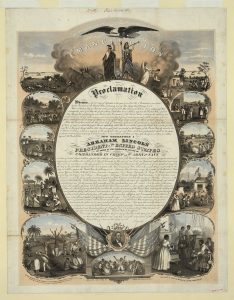Introduction:

https://www.loc.gov/pictures/item/2003671404/
On and around June 19, many African American communities across the United States will celebrate Juneteenth, the jubilant recollection of slavery’s destruction in the United States. Given the current intersection of race, politics, and Civil War Memory, the Civil War Governors of Kentucky (CWGK) team wanted to make its contribution to that discussion by doing what it does best: offering historical documents, perspective, and the opportunity for individuals to learn more about the nation’s past.
The CWGK staff support the Kentucky Historical Society’s message about the recent national conversations, protests, and debates regarding race and the lives of African Americans. Today’s events are part of a long, unbroken sequence of connections stemming from the institution of slavery and the earliest foundations of American History. It is impossible to divorce the lives of the formerly enslaved and the legacies of slavery from our memory about the Civil War and its aftermath.
Below are links to resources that CWGK has available on our site or that our staff members have helped create over the years. Where appropriate, I have provided interpretive context to help guide you through these documents and larger materials. This is not an inclusive list of what CWGK offers, but represents a starting point to broaden our interpretation and understanding of the Civil War, slavery, and the lives of African Americans in Kentucky.
The Caroline Chronicles:
Without question, the most deeply utilized part of CWGK is our work on Caroline Dement. A self-emancipated woman from Tennessee, who made her way to Louisville with the United States Army, Caroline was placed in the house of the Levy family until her master could claim her. While in the Levy household, Blanche, a young child under Caroline’s care, died from strychnine poisoning. The family accused Caroline of intentionally poisoning the child and a jury agreed before influential Louisvillians petitioned Governor Thomas Bramlette and secured her pardon. Although she disappeared from the historical record after leaving the Jefferson County Jail, Caroline’s story appears in one of CWGK’s exhibits, a short documentary, and a journal article.
- Exhibit: The Caroline Chronicles
- Video: Chronicle: Kentucky History Magazine Video
- Article: Carole Emberton, “Disciplined Imagination” and the Limits of the Archive, in the Register of the Kentucky Historical Society, Vol. 117, No. 2: https://muse.jhu.edu/article/732592
Blog Posts:
Over the years, CWGK staff have devoted their time and interpretive expertise to blog posts that address different aspects of African American history pulled from documents found on our site. Here are a handful of those posts, and in the future, please visit our blog for more:
- To Own Life and Death: The Boundaries of Race and Mastery
- Wanted, Dead or Alive: The Fugitive Jim Brown and the Price of Loyalty
- Protecting Slavery in a Union State: The Letter vs. the Spirit of the Law
- Slavery, Sexual Violence, and the Law
Documents:
CWGK has more than 10,000 digitized and transcribed documents on our site. Below are a handful (but certainly not all) that pertain to African Americans, slavery, and emancipation. As you will note, most of these sources talk about, but rarely come from African Americans themselves. Furthermore, these documents often deal with African Americans in precarious positions—as freedom seekers trying to escape the cruelty of slavery, as suspects in violent crimes, or wrapped up in the punishments of white Kentuckians.
- Slavery and Capitalism Subject Guide
- W. W. Crandell, Affidavit
- This document highlights the use of an enslaved man in a sting operation to catch a thief on the border of Jefferson and Bullitt Counties
- W. H. Calvert et al., to Beriah Magoffin
- This petition relays the case of West/Wesley, an enslaved man who committed murder against his will and at the behest of his master
- C. A. Wandelohr et. al., to Thomas E. Bramlette
- Polly Southgate, a free African American woman is fined for letting her enslaved husband hire himself out to support their family
- W. H. Stokes and C. M. Metcalfe, Affidavit
- This affidavit touches on the punishment of abolitionists who attempt to help two enslaved individuals to escape
Despite all of the resources at our disposal, it is important to acknowledge that CWGK still knows more about white Kentuckians (especially white males) than their African American counterparts. A larger portion of this imbalance comes from realities of nineteenth-century life. Enslavement not only robbed African Americans of their personal freedom, rights, and personhood, but it also deprived countless enslaved men and women of an education. For every Frederick Douglass who learned to read and write while enslaved, innumerable other African Americans had no access to an education, as the practices of enslavers denied enslaved men, women, and children any semblance of humanity—monetarily, educationally, or personally.
CWGK attempts to tell the story of all ordinary Kentuckians, not just the nominal governors who frame our project’s temporal and administrative boundaries. We are, unfortunately, limited by the pervasive silence that dominates archival, political, and social spaces across an uncomfortable breadth of American history. CWGK, and this resource list, are an attempt to redress that imbalance. We have made good strides in drawing out the voices and experiences of black Kentuckians, but there is still much more work to do. We look forward to offering you that perspective in the future.
